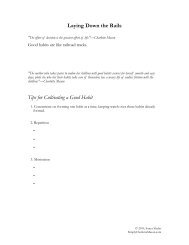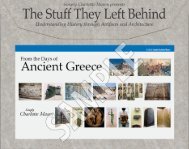Laying Down the Rails for Children - Simply Charlotte Mason
Laying Down the Rails for Children - Simply Charlotte Mason
Laying Down the Rails for Children - Simply Charlotte Mason
Create successful ePaper yourself
Turn your PDF publications into a flip-book with our unique Google optimized e-Paper software.
Decency and Propriety Habits<br />
keepers of <strong>the</strong> jail and especially by <strong>the</strong> judges and officers of <strong>the</strong> city courts. And many<br />
kind-hearted people, hearing of her good works, lent her a helping hand. Every year a<br />
certain charitable society placed in her hands several thousand dollars to be expended in<br />
her work in such ways as she thought best.<br />
Often <strong>the</strong> money which she received from o<strong>the</strong>rs was not enough, and <strong>the</strong>n she<br />
drew freely from her own means, never expecting any return. To help a poor outcast<br />
to a fresh start in life, to give relief to <strong>the</strong> innocent family of some convicted criminal,<br />
to put in <strong>the</strong> way of some un<strong>for</strong>tunate man or woman <strong>the</strong> means of earning an honest<br />
living—to do <strong>the</strong>se and a thousand o<strong>the</strong>r services she was always ready.<br />
Many are <strong>the</strong> stories that are told of her golden deeds. Perhaps none show more<br />
clearly her self-sacrificing spirit than <strong>the</strong> following: —<br />
One day a poor woman, <strong>the</strong> wretchedest of <strong>the</strong> wretched, was brought to <strong>the</strong> prison<br />
guilty of a crime to which her weakness and her extreme want had driven her. She was<br />
cold, she was staring, she was in tatters and rags.<br />
Here surely was work <strong>for</strong> a ministering angel.<br />
Mrs. Foster hastened to give her such immediate com<strong>for</strong>t as she could. She removed<br />
<strong>the</strong> poor wretch’s bedraggled dress, and gave her her own warm overskirt, instead.<br />
Was <strong>the</strong>re ever a nobler example of Christian charity?<br />
We are reminded of Sir Philip Sidney on <strong>the</strong> field of Zutphen and his gift to <strong>the</strong><br />
dying soldier, “Thy necessity is greater than mine.”<br />
And so, untiringly and without a thought of self, <strong>the</strong> Tombs Angel went on with<br />
her work, little thinking what men would say, dreaming nothing of honor or fame,<br />
caring only to lighten <strong>the</strong> burdens of <strong>the</strong> heavy-laden. Then, suddenly and with but little<br />
warning, she was called to pass out through fire into <strong>the</strong> kingdom prepared <strong>for</strong> those<br />
who love <strong>the</strong>ir Lord.<br />
Who would not sorrow <strong>for</strong> such a woman?<br />
Even <strong>the</strong> officers whose duty it was to prosecute <strong>the</strong> prisoners in <strong>the</strong> Tombs wept<br />
when her death was announced. The eyes of <strong>the</strong> judges were filled with tears. The city<br />
courts adjourned <strong>for</strong> <strong>the</strong> day in honor of <strong>the</strong> memory of <strong>the</strong> Tombs Angel. And on<br />
<strong>the</strong> following Sunday, in more than one church, a well-known parable was read with a<br />
meaning that was new and strangely <strong>for</strong>cible to those who listened:—<br />
“Then shall <strong>the</strong> King say unto <strong>the</strong>m on his right hand, ‘Come, ye blessed of my<br />
Fa<strong>the</strong>r, inherit <strong>the</strong> kingdom prepared <strong>for</strong> you from <strong>the</strong> foundation of <strong>the</strong> world. For<br />
I was an hungered, and ye gave me meat. I was thirsty, and ye gave me drink. I was a<br />
stranger, and ye took me in; naked, and ye clo<strong>the</strong>d me. I was sick and ye visited me. I<br />
was in prison, and ye came unto me.’<br />
“Then shall <strong>the</strong> righteous answer him, saying, ‘Lord, when saw we <strong>the</strong>e an hungered,<br />
and fed <strong>the</strong>e? Or thirsty, and gave <strong>the</strong>e drink? When saw we <strong>the</strong>e a stranger, and took<br />
<strong>the</strong>e in? or naked, and clo<strong>the</strong>d <strong>the</strong>e? Or when saw we <strong>the</strong>e sick, or in prison, and came<br />
unto <strong>the</strong>e?’<br />
“And <strong>the</strong> King shall answer and say unto <strong>the</strong>m, ‘Verily, I say unto you, inasmuch as<br />
ye have done it unto one of <strong>the</strong> least of <strong>the</strong>se my brethren, ye have done it unto me?’ ”<br />
Notes<br />
Lesson 7<br />
Talk over point six toge<strong>the</strong>r. Discuss how movies or books or friends might turn our<br />
thoughts toward being selfish instead of being kind. O<strong>the</strong>r possible examples: When<br />
you look through a catalog that comes in <strong>the</strong> mail or watch a commercial, do you think<br />
about how <strong>the</strong> items in it might be used to help o<strong>the</strong>rs, or do you automatically think<br />
about what you want? What about when a friend says not to play with a younger sibling<br />
or shows you his newest electronic toy?<br />
<strong>Simply</strong><strong>Charlotte</strong><strong>Mason</strong>.com 37
















